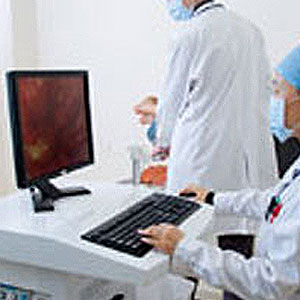
After 50 years of development, electronic colonoscopy has been widely applied in clinics. Colonoscopy is indicated to hematochezia of unknown origin, diarrhea, non smooth defecation, changes in bowel habits, constipation, stomachache and abdominal mass. It can make diagnosis of all kinds of large intestine disorder and it can precisely determine on the property (benign or malignant), size, shape and stage of the tumor. Moreover, colonoscopy provides clues for treatment, especially for surgery, as it can observe the lesion changes dynamically.
Colonoscopy is also available for biopsy, cytological examination, bacteriology examination and mucosal staining, and the operation process and the condition of lesion will be recorded. Conducting biopsy under direct vision is an outstanding advantage of colonoscopy. If suspicious lesions are found, conduct tissue biopsy and pathological examination to confirm diagnosis. Cytologic smear is vital to diagnosing of malignant tumor and it can cover the shortage of biopsy. For those with severe luminal stenosis, as the colonoscopy cannot reach the lesion, cytologic smear is particularly important. The colonoscopy can be done with no pain.
In the treatment guided by gastrointestinal endoscopy, the high frequency electric energy is commonly used to remove the intestinal polyps. The high frequency electric energy, microwave and laser can be applied to treat various types of bleeding and relieve neoplastic stenosis. The endoscopic mucosal resection is a new technique with extensive development in recent years. It is indicated to the biopsy of undiagnosed lesion in conventional biopsy, resection of early-stage intestinal cancer and large, benign and ridgy lesion



